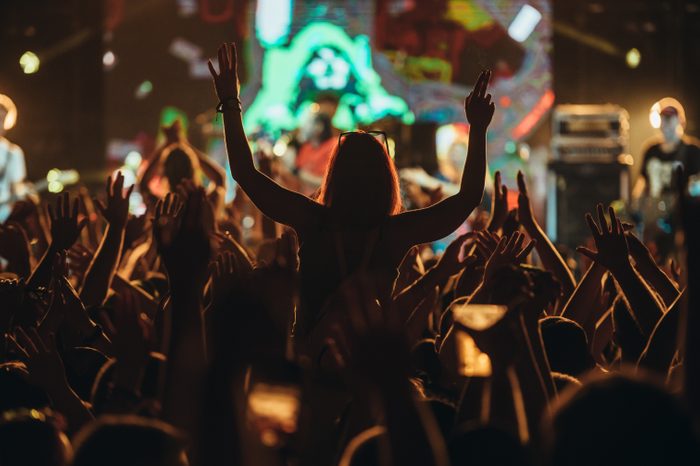This Is When You Should Be Wearing Ear Plugs

We talked to an audiologist about the importance of protecting your hearing at concerts—and also just in everyday life.
As a lifelong concert-goer, I was excited to spend my summer catching my favourite bands at crowded venues. But after my first show of the season, I woke up the next day with a raging hangover-like headache, even though I hadn’t had any alcohol all night. Could the music volume and screaming fans (myself included) be the problem?
To find out, I wore a pair of silicone ear plugs at my next concert and was surprised to discover the immediate difference they made. The ear plugs felt as comfortable as having my AirPods on—plus, they muted the crowd’s screams and crystallized the artist’s voice. Instead of hearing the sobs and screams of my fellow fans, I could fully enjoy the music. The next morning, I was headache-free and didn’t have ringing in my ears.
Almost a dozen concerts later, my ear plugs continue to be my go-to accessory. I’ve even begun wearing them in loud bars and clubs. But now that I feel so much better on those mornings after, I wonder if I should wear them in other loud environments, too. In other words, how important are ear plugs for your health?
We spoke to Mahsa Mosstaghimi-Tehrani, an audiologist and owner of Toronto Family Hearing clinic, to find out.
Do concerts and other loud environments damage hearing?
They certainly can. According to Mosstaghimi-Tehrani, there are three factors that’ll help you determine if an environment is detrimental to your hearing. First, how loud it is—the easiest way to figure this out is by using apps like Decibel Pro, Decibel X and Sound Meter. Decibels are used to measure the intensity of sound. Below 70 decibels is generally considered safe while 85 and above is likely to damage your hearing over time. Second, how close you are to the sound source matters. The closer you are, the more at risk you are. (If you’re right next to the speakers, you’re much more at risk than if you were sitting back in the nosebleeds.) Third, consider how how long you’ll be exposed to the sound. The longer you’re exposed, the more damage it causes. The workplace safety standard is 85 decibels for 8 hours. For every additional 3 decibels, the exposure time has to be cut in half. Meaning for 88 decibels, the safety standard is 4 hours, and for 91 decibels, it’s 2 hours.
Concerts are a perfect storm of these three factors. Mosstaghimi-Tehrani says they can exceed 100 decibels “and within a few minutes, that can cause hearing loss.” Plus, they typically constitute at least a couple hours’ worth of exposure. And, if you’re someone who likes to hang out by the stage and speakers, you’re exposing your ears to potentially damaging levels of sound.
What are the effects of hearing damage?
Short term, being exposed to loud noises can cause temporary hearing loss that resolves in about 48 hours, says Mosstaghimi-Tehrani. You could also experience temporary threshold shifts (this is when your hearing is muffled, indicating that you’ve experienced hearing loss and your system is trying to recoup) that can become long-term diminished hearing, she says.
According to Mosstaghimi-Tehrani, being continually exposed to loud noises can cause tinnitus (ringing in your ears) that can be temporary or long-term, and you can experience permanent hearing loss. “There are receptor cells within our cochlea, and it’s the job of those cells to receive the sound and transmit the information to our brain,” says Mosstaghimi-Tehrani. These little cells can be damaged when exposed to too much sound. “And that’s what causes hearing loss—those receptors aren’t able to do their job.”
How do ear plugs protect my hearing?
Ear plugs limit the amount of decibels your ears are exposed to, which in turn protects your hearing, explains Mosstaghimi-Tehrani. Most ear plugs reduce the amount of decibels entering your ears by about 10 to 20. “So, if you’re at a concert for a couple of hours and it exceeds 90 decibels, that’s enough that could cause noise-induced hearing loss,” she says. “Using ear plugs that take that down from 90 to 80, for instance, buys you more time at that level of exposure.”
What should I look for when buying ear plugs?
First and foremost, a proper fit. Try this: Insert an ear plug and cup your hands over your ear. If you experience no change to your hearing, it’s a good fit. If your hearing becomes more muffled, that means there’s space not covered by the ear plugs, and therefore won’t protect your hearing enough.
The second most important thing when shopping for ear plugs is looking at how many decibels the ear plugs reduce—10 to 30 is ideal.
Another option is to go for safety earmuffs (which look like normal headphones). They protect hearing while reducing the chance of improper insertion. “They’re easy to put on properly and there’s more material between you and the noise,” she says, which provides more protection.
Should anyone consider wearing ear plugs day-to-day?
Mosstaghimi-Tehrani says most people don’t need to wear them for everyday matters unless you work somewhere loud or you’re in loud environments often. To be sure, you can check out the decibels wherever you are by popping open your preferred app.
How else can I protect my hearing?
“Everyone should do a baseline hearing test,” says Mosstaghimi-Tehrani. This test calculates your baseline ear health and analyzes how much your hearing has been damaged so that you can modify behaviours if need be. She also says everyone should get their ears routinely checked by an audiologist to assess your hearing health and determine what measures should be taken to protect your ears. “How do you know how to protect yourself if you don’t know your baseline?”
Next: I Wear Headphones All Day When I Work, Am I Ruining My Hearing?




